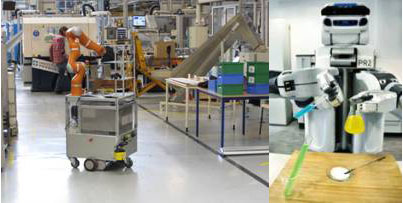ACAT focuses on how artificial systems (robots) understand and utilize information made for humans. The project is coordinated by Institute for Physics III, Georg August University Göttingen (Germany). Additional partners to the project include The Maersk Mc-Kinney Moller Institute, Aalborg University (Denmark), Vytauto Didziojo University (Lithuania), Jozef Stefan Institute (Slovenia) and University of Bremen (Germany). ACat is funded by European Commission ICT - Information and Communication Technologies - Grant Nr. 600578.

ACAT focuses on the problem how artificial systems (robots) can understand and utilize information made for humans. For this, ACAT generates a dynamic process memory by extraction and storage of action categories from large bodies of human compatible sources (text, images). Action categories are designed to include the actual action-encoding but also large amounts of context information ("background"). They are obtained by combining linguistic analysis with grounded exploration and action-simulation and are assembled in the action-specific knowledge base of ACAT. The ACAT system then uses action-categories to compile robot-executable plans.
Execution benefits strongly from the rich context information present in the action-categories because this allows for generalization (for example replacement of objects in an action). It also permits us to specifically address ambiguity, incompleteness and uncertainty in planning. Plans are grounded by perception and execution, which takes place by a robot. This leads to a life-long update process of the knowledge base.
The ultimate purpose of ACAT is to equip the robot – on an ongoing basis – with abstract, functional knowledge, normally made for humans, about relations between actions and objects leading to a system which can act meaningfully. As industrially relevant scenario, ACAT uses "instruction sheets" (manuals), made for human workers, and translates these into a robot-executable format. This way the robot will be able to partially take over human tasks without time-consuming programming procedures. Similar to computer science, where the development of the first compilers had led to a major step forward, the main impact of this project is that ACAT develops a robot-compiler, which translates human understandable information into a robot-executable program.
Contact:
Project partners:
University of Southern Denmark, Denmark; University of Göttingen, Germany; Aalborg University, Denmark; Vytautas Magnus University, Lithuania; Jožef Stefan Institute, Slovenia; University of Bremen, Germany